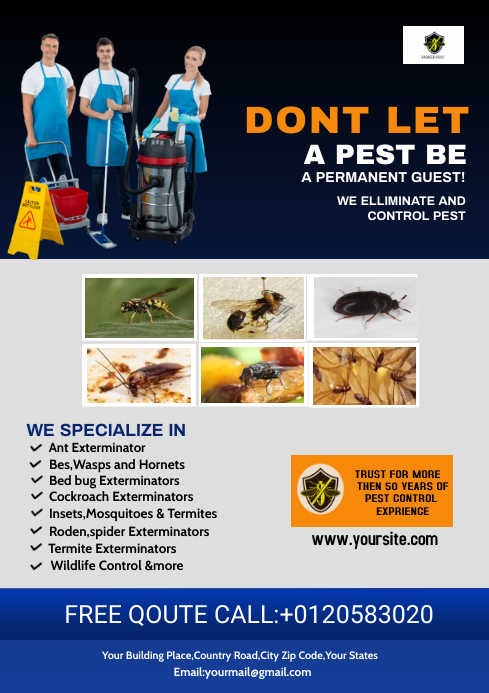Dependable Pest Control Auckland: Specialist Extermination and Prevention
Dependable Pest Control Auckland: Specialist Extermination and Prevention
Blog Article
Comprehending Various Sorts Of Pest Control Techniques and Their Performance
The administration of pests is a critical aspect of keeping the health and wellness and honesty of numerous atmospheres, from agricultural areas to domestic homes. When taking into consideration parasite control approaches, it is vital to recognize the varied methods available and their varying levels of efficiency. From chemical interventions to organic solutions, each approach presents unique advantages and restrictions. By checking out the subtleties of these parasite control strategies, a detailed understanding of how to attend to bug problems can be created.
Chemical Insect Control Techniques
Chemical insect control approaches play a pivotal role in efficiently managing and eradicating pest infestations in various settings. These techniques involve the use of chemical substances to eliminate or deter pests such as weeds, rats, and pests. One of the crucial benefits of chemical parasite control is its capacity to offer quick and targeted remedies to pest problems. By utilizing details chemicals that are made to target certain parasites, this method can assist prevent damage to crops, structures, and human health and wellness.
Nonetheless, it is necessary to think about the prospective risks and disadvantages connected with chemical parasite control techniques. Overreliance on chemicals can bring about the growth of chemical resistance in bugs, making them tougher to control in the long run. Furthermore, making use of particular chemicals can have hazardous impacts on non-target microorganisms, the atmosphere, and human health otherwise applied correctly.

Organic Pest Control Techniques
Making use of all-natural killers and virus to take care of pest populaces efficiently, biological bug control methods offer a lasting and green approach to pest monitoring. By introducing or promoting the activity of microorganisms that normally victimize or contaminate insects, such as ladybugs for aphid control or specific microorganisms for caterpillar infestations, organic control can assist keep parasite populations at convenient degrees without the requirement for artificial chemicals. This method is specifically helpful for chemical-free farming practices, as it stays clear of making use of potentially unsafe substances while keeping plant wellness.

Physical Insect Control Techniques
While biological insect control techniques concentrate on using all-natural predators and microorganisms, physical parasite control methods utilize physical and mechanical barriers to take care of bug populations. These approaches are usually thought about environmentally friendly as they decrease using chemicals. Physical insect control includes techniques such as capturing, making use of obstacles like nets or displays, and physically eliminating insects from the area.
Catches are generally utilized in physical pest control to catch and get rid of parasites like insects and rats. Another physical technique is the usage of barriers such as webs, fencings, or displays to prevent parasites from going into or infesting certain locations.
Natural Pest Control Techniques
Integrating all-natural killers and plant-based repellents is a vital approach in executing efficient natural bug control approaches. By encouraging the presence of beneficial pests like ladybugs, lacewings, or aggressive termites, garden enthusiasts can naturally manage pest populaces. These predators feed on typical garden bugs such as caterpillars, aphids, and mites, assisting to preserve a balanced environment without the need for chemical interventions.

Furthermore, applying social methods such as crop turning, companion growing, and preserving correct plant health and wellness can likewise enhance the performance of all-natural insect control techniques. These techniques not only help in avoiding insect infestations yet additionally promote biodiversity and overall ecosystem resilience. By incorporating these all-natural methods, individuals can efficiently handle parasites while decreasing ecological impact.
Integrated Insect Management (IPM) Method
Implementing an Integrated Parasite Monitoring (IPM) method is essential for successfully regulating bug populaces while reducing reliance on chemical pesticides. IPM is a sustainable and thorough strategy that integrates different pest control methods to achieve long-lasting solutions. This technique concentrates on control, surveillance, and prevention to attend to bug issues in an eco-friendly way.
IPM integrates organic, social, physical, and mechanical strategies with the minimal and tactical usage of pesticides when required. By emphasizing positive measures such as habitat modification, biological control, and exemption, IPM aims to decrease parasite populations and their impact on the ecosystem. Regular monitoring is vital in IPM to evaluate pest levels precisely and determine the most suitable control techniques.
Among the vital advantages of IPM is its ability to decrease the visit their website threats connected with extreme chemical use, such as ecological contamination and harm to non-target microorganisms. Furthermore, IPM promotes a more all natural strategy to pest management by thinking about the general environment characteristics. Overall, the IPM approach supplies a lasting and reliable option for bug control while promoting ecological duty.
Conclusion
In final thought, comprehending the various types of parasite control methods and their effectiveness is essential in effectively managing insect invasions. Integrated Parasite Management (IPM) method, which combines numerous methods for lasting insect control, is significantly being identified as a environmentally friendly and holistic solution.
Chemical insect control approaches play a pivotal function in effectively taking care of and eradicating pest infestations in various atmospheres.Utilizing natural predators and the original source pathogens to manage insect populations efficiently, biological parasite control techniques supply a environmentally friendly and sustainable approach to pest administration. By advertising the activity or introducing of microorganisms that naturally prey on or contaminate insects, such as ladybugs for aphid control or specific bacteria for caterpillar infestations, organic control can help preserve insect populations at workable degrees without the need for artificial chemicals.While organic insect control methods focus on taking advantage of natural predators and pathogens, physical parasite control techniques use physical and mechanical obstacles to manage pest populaces. Integrated Insect Administration (IPM) approach, which incorporates numerous approaches for lasting bug control, is significantly being recognized as a eco friendly and all natural service.
Report this page